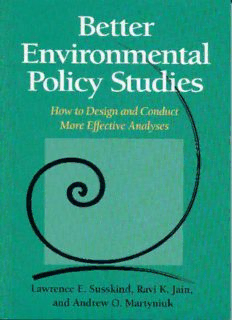
Better Environmental Policy Studies: How To Design And Conduct More Effective Analyses PDF
Preview Better Environmental Policy Studies: How To Design And Conduct More Effective Analyses
About Island Press Island Press is the only nonprofit organization in the United States whose principal purpose is the publication of books on environmental issues and natural resource management.We provide solutions-oriented information to professionals, public officials, business and community leaders, and concerned citizens who are shaping responses to environmental problems. In 2001, Island Press celebrates its seventeenth anniversary as the lead- ing provider oftimely and practical books that take a multidisciplinary ap- proach to critical environmental concerns. Our growing list of titles reflects our commitment to bringing the best of an expanding body of lit- erature to the environmental community throughout North America and the world. Support for Island Press is provided by The Bullitt Foundation, The Mary Flagler Cary Charitable Trust, The Nathan Cummings Foundation, Geraldine R.Dodge Foundation,Doris Duke Charitable Foundation,The Charles Engelhard Foundation, The Ford Foundation, The George Gund Foundation, The Vira I. Heinz Endowment, The William and Flora Hewlett Foundation,W.Alton Jones Foundation,The John D.and Cather- ine T. MacArthur Foundation, The Andrew W. Mellon Foundation, The Charles Stewart Mott Foundation,The Curtis and Edith Munson Founda- tion, National Fish and Wildlife Foundation, The New-Land Foundation, Oak Foundation, The Overbrook Foundation, The David and Lucile Packard Foundation, The Pew Charitable Trusts, Rockefeller Brothers Fund,The Winslow Foundation,and other generous donors. Better Environmental Policy Studies Better Environmental Policy Studies How to Design and Conduct More Effective Analysis n Lawrence E. Susskind Ravi K. Jain Andrew O. Martyniuk Washington • Covelo • London © 2001 by Island Press All rights reserved under International and Pan-American Copyright Conventions.No part ofthis book may be reproduced in any form or by any means without permission in writ- ing from the publisher:Island Press,1718 Connecticut Ave.,N.W.,Suite 300,Washington, DC 20009. Library ofCongress Cataloging-in-Publication Data Susskind,Lawrence. Better environmental policy studies :how to design and conduct more effective analyses / Lawrence E.Susskind,Ravi K.Jain,Andrew O.Martyniuk. p.cm. Includes bibliographical references and index. ISBN 1-55963-870-2 (acid-free paper) — ISBN 1-55963-871-0 (pbk.:acid-free paper) 1. Environmental policy—United States—Evaluation.2. Environmental policy—United States—Evaluation—Case studies. I.Jain,R.K.(Ravinder Kumar),1935– II.Martyniuk, Andrew O.III.Title. GE180 .S855 2001 363.7'056'0973—dc21 2001003712 British Library Cataloguing in Publication data available. Printed on recycled,acid-free paper Manufactured in the United States ofAmerica 10 9 8 7 6 5 4 3 2 1 Contents Preface xi CHAPTER 1. Introduction 1 Setting the Stage 1 Conducting Policy Studies 4 CHAPTER 2. The Conventional Approach to Environmental Policy Studies 7 How Environmental Policy Studies Are Usually Done 8 Define the Issue 8 Choose a Consultant 9 Write a Contract 9 Perform the Analysis 10 Submit a Draft Report 10 Produce and Disseminate a Final Report 10 The Connection Between Policy Studies and Policy Making 11 Comments on the Conventional Approach 14 CHAPTER 3. How Environmental Policy Studies Can Be Used Effectively 17 Six Effective Policy Studies 17 The “Uses”of Effective Policy Studies 18 The Studies and Their “Uses” 20 The Delaney Paradox and Pesticide Regulation 20 Lead in Gasoline and the Reduction ofLead Levels in Ambient Air 31 Complex Cleanup and the Environmental Legacy ofthe Nuclear Weapons Complex 39 Reducing Risk and Setting Environmental Priorities at the EPA 44 vii viii CONTENTS AARC and New Farm Products Research and Commercialization 48 The Spotted Owl and Ecosystem Management in the Pacific Northwest 56 The Challenges 61 Concluding Remarks 62 CHAPTER 4. How Policy Studies Should Be Organized 65 Six Organizational Tasks 65 Selecting and Using Experts 66 Shaping the Relationship Between Sponsors and Experts 70 Choosing the Right Institutional Auspices 76 Reviewing Policy Study Results 77 Learning from Policy Studies 80 Setting the Policy Research Agenda 82 A Look in the Rearview Mirror 84 Concluding Remarks 87 CHAPTER 5. Methods and Roles of Environmental Policy Studies 89 Approaches to Policy Studies 90 Systems Analysis 91 Decision Theory 95 Institutional Rational Choice Theory 96 Policy Analysis Within the Political Context 97 New Theories:Post-Positivist Participatory Approaches to Policy Analysis 100 Participatory Policy Analysis 100 Participatory Expertise 101 Critical Theory 103 Beyond Participation—Networks,Coalitions, and Communities 104 Policy Networks 104 Advocacy Coalition Framework 107 Epistemic Communities 108 Concluding Remarks 111 CONTENTS ix CHAPTER 6. Rethinking the Choice of Methods for Policy Analysis 113 Analytical Methods 113 Lead in Gasoline 115 The Delaney Paradox 115 RhetoricalMethods 116 Reducing Risk 118 Process Methods 118 AARC 118 Spotted Owl 119 Putting It All Together: The Issue of Chlorinated Organic Compounds Revisited 119 Enhancing the Interplay of Theory and Practice 121 Knowledge and Learning in Environmental Policy Making 121 Role ofScience and Technical Knowledge 122 Policy Studies Can Often Raise More Questions 124 There Is Still Great Room for Progress 124 Concluding Remarks 128 CHAPTER 7. International Perspectives 129 What We Think We Know 129 Regional/National Environmental Issues with International Implications 130 Changing Priorities 132 International Environmental Negotiation 133 Policy Study Implications 134 Global Warming 136 Policy Options 137 United States Global Change Research Program 138 Intergovernmental Panel on Climate Change 139 Kyoto Conference 140 Interrelationship ofNational and International Efforts and the Role ofTechnology 142 Genetically Modified Foods 144 Transgenic Crops 145 Policy Issues 146
Description: